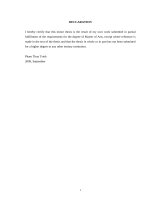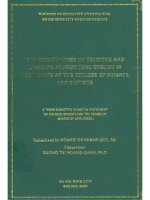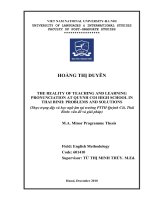The methods of teaching and learning english vocabulary
Bạn đang xem bản rút gọn của tài liệu. Xem và tải ngay bản đầy đủ của tài liệu tại đây (118.41 KB, 12 trang )
TABLE CONTENT
A. INTRODUCTION
I. Resons for choosing the topic
II. Aims of the study
III. Scope and research methodology
B. MAIN CONTENT
I. Theoretical backgroud
II. Practical background
III. Methods for implementation
C. RESULT AFTER APPLYING THE STUDY
D. CONCLUSION
E. REFERENCE BOOKS
1
A. INTRODUCTION:
I. REASONS FOR CHOOSING THE TOPIC.
English is widely used as an international language and it is considered the second
language of all countries in the world. Thanks to the English that people around the
world know and understand each other. English is one of the languages that have
rich vocabulary, so students and people who use it do not encounter difficulties.
Vocabulary is one of the most important parts of language learning, in any case:
listening, speaking, reading or writing we also need a relatively large vocabulary.
Unlike the learning of grammar, which is essentially a rule based system,
vocabulary knowledge is largely a question of accumulating individual items. In
fact, students are "afraid" to learn new words, the use of words is limited:
misspelling, using the word incorrect, inconsistent with context. Most of the
students have a habit of memorizing the meaning of words.
All the above is because the students do not find themselves appropriate methods
to learn vocabulary. As a teacher of English at Quang Xuong 4 high school in
recent years, I fully understand and sympathize with the difficulties my students
often encounter in the learning of English vocabulary. Somehow I want to help
them overcome these difficulties. That is the reason for which I choose this topic.
I have applied these methods in teaching and learning English at Quang Xuong 4
high school, especially for 11th grade students in school year 2017-2018 and got
satisfactory results. I, therefore, would like to share my own experience in this
study.
II. AIMS OF THE STUDY.
In the suggestion of some methods of teaching and learning English vocabulary.
III. SCOPE AND RESEARCH METHODOLOGY.
- Scope: Researching in the process of teaching English at Quang Xuong 4 high
school.
- Research methodology: making survey, reading reference books, applying in
teaching, observing and drawing out experiences.
2
B. MAIN CONTENT.
I. THEORETICAL BACKGROUND
Principles of learning and teaching vocabulary:
However many theories about vocabulary learning process were written , it still
remains the matter of memory. Thus, there are several general principles for
successful teaching , which are valid for any method. According to Wallace, 1988
the principles are:
+ Aim – what is to be taught, which words, how many.
+ Need – target vocabulary should respond students’ real needs and interests
+ Frequent exposure and repetition.
+ Meaningful presentation – clear and unambiguous denotation or reference should
be assured.
Learning vocabulary is a complex process. The students’ aim to be reached in
learning vocabulary process is primarily their ability to recall the word at will and
to recognize it in its spoken and written form. Generally, knowing a word involves
knowing its form and its meaning at the basic level. In deeper aspects it means the
abilities to know its (Harmer 1993):
1-Meaning, i.e. relate the word to an appropriate object or context.
2-Usage, i.e. knowledge of its collocations, metaphors and idioms, as well as style
and register (the appropriate level of formality), to be aware of any connotations
and associations the word might have.
3-Word formation, i.e. ability to spell and pronounce the word correctly, to know
any derivations (acceptable prefixes and suffixes).
4-Grammar, i.e. to use it in the appropriate grammatical form.
II. PRACTICAL BACKGROUND
1. The views of teachers and students.
Teachers:
Most teachers are subjective and less attentive to explore how students learn the
vocabulary, the majority of teachers only briefly examine students through their
reading or writing the words. This leads to a remain problem, students only learn
the vocabulary to cope with the situations.
Students:
The majority of students when are asked whether they enjoy learning English or
not? The answer is yes, however, the big problem that they often meet is how to
learn vocabulary effectively. Because they find that learning English vocabulary is
difficult and takes more time to remember, so most students are lazy and afraid to
learn.
3
III. METHODS FOR IMPLEMENTATION
1. Learning word families:
A word family is the base form of a word plus its inflected forms and derived forms
made from affixes. In the English language, inflectional affixes include third person
-s, -ed, -ing, plural -s, possessive -s, comparative -er and superlative -est.
Derivational affixes include -able, -er, -ish, -less, -ly, -ness, -th, -y, non-, un-, -al,
-ation, -ess, -ful, -ism, -ist, -ity, -ize, -ment, in- . The idea is that a base word and its
inflected forms support the same core meaning, and can be considered learned
words if a learner knows both the base word and the affix.
Learning word families helps beginning learners to analyze and decode words. As
learners know some of the basic word building patterns of English, particularly
plural, past tense, present tense, stem+ing, stem+ed, possessive, it is more sensible
to count word families than to count word types.
For example:
Employ
Happy
Success
Employment
Happily
Successful
Unemployment
Happiness
Unsuccessful
Employed
Unhappy
Successfully
Unemployed
Unhappiness
Unsuccessfully
Employee
Succeed
Employer
Succeeding
UNIT 4: VOLUNTEER WORK, PART A: READING (English 11)
Task 1. The word volunteer appears in the passage in different parts of speech. Use
an appopriate form of the word volunteer to complete ech of the following
sentences.
+Teacher elicits different parts of speech of the word “volunteer” and writes these
words on the board.
+Instructs students to read through the sentences provided in the task to identify the
part of speech of the word to fill in each blank.
+Reminds students to pay attention to the word preceding and following the blank
to fill in the right form of the word.
1-When she retired, she did a lot of ……………... service for the Red Cross.
2-She was not fired. She left the company …………….. .
3-She needs some ……………….. to cleen up the kitchen.
4-Last month the company ………………… to donate fifty trucks to help the
flooded areas.
Answer keys:
1. voluntary
2. voluntarily
3. volunteers
4. volunteered
4
Furthermore, an understanding of word families allows either the form or the
meaning of unfamiliar words to be guessed with some confidence. For example,
students can guess that someone using a skate-board is a skate-boarder. It is easy to
remember.
2. Using synonyms and antonyms.
Students can explore and recall the words they have learned before by giving the
synonyms and antonyms of the words.
In the class, the teacher or one student of each group gives a word or phrases and
asks the other students to give their synonyms or antonyms. This activity can be
conducted as a game with two groups of students. The winner should be awarded
prizes, which certainly encourages students.
At home, students will rewrite the words they have learnt in the class on their
vocabulary notebooks. This method is the useful way to inculcate the words.
For example:
UNIT 1: FRIENDSHIP, English 11.
- Teacher asks students to work in pairs and do the Task.
Match each word with the best synonyms.
1. __________ affair
a. honest
2. __________ constancy
b. busines
3. __________ pursuit
c. whisper
4. __________ rumour
d. hobby, pastime
5. __________ sincere
e.fidelity
3. Learning collocations:
Collocations are combinations of words that are commonly used together like
absolutely fantastic, educational development, object to, give up, the rich and
famous, at once, in a minute, the United States of America.
Collocation forms:
+ Adj + noun
+ Verb + noun
+ Noun + verb
+ Adv + adj
+ Verb + adverb/ prepositional phrase
+ Noun + noun
+ Phrasal verbs
The best way to learn English collocations is to find the most frequently used
words in the English language, write these collocations (they should be devided
into topics so that it is easy to remember) on notebooks and study the most
frequently used collocations with those words.
5
Learning collocations helps students use the language fluently, and they are easy to
identify and understand the exact meaning of the word in different concrete
context.
For example:
UNIT 10: NATURE IN DANGER, PART A: READING (English 11)
Read the passage and complete the following table.
The human race is only once small species in the living world. Many other species
exist on this planet. However, human beings have a great influence on the rest of
the world. They are changing the environment by building cities and villages where
forests once stood. They are affecting the water supply by using water for industry
and agriculture. They are changing weather conditions by cutting down trees in the
forests. And they are destroying the air by adding pollutants to it.
It can be said that human beings are changing the invironment in all respects
through their actions and by their habits. This has resulted in two serious
consequences. The first is that many kinds of rare animals are killed. The second is
that the environment where these animals are living is badly destroyed. As a result,
the number of rare animals is decreasing so rapidly that they are in danger of
becoming extinct.
Line
1
Topic: Nature In Danger
Collocations
Meaning
human race
loài người
Example
The human race is
only once small
species in the
living world.
4. Miming:
Especially for actions, we can act out a word to demonstrate its meaning. For
example, when teaching the words blow, laugh, smile, cough, pain, have a
headache/ toothache, kick or shoot, jump, etc.
To check that students understand the words correctly, teacher writes the words on
cards and asks some students to act out in front of the class, the other students have
to say the word. This engages students in their learning.
5. Giving examples.
After learning the words in class teachers guide students to make simple sentences
with those words at home. From which students can remember words and phrases
in a simple way and they can use the words correctly.
For example:
6
floppy
glance
embrace
Students can give examples as follows:
I like this floppy hat.
He glances at his watch.
She embraced her son warmly.
6. Using pictures.
Using appropriate photographs, prints, pictures or paintings to introduce the new
words is one of the meaningful way that helps students understand and remember
the words quickly.
For example:
A floppy cotton hat. (Unit 2: PERSONAL EXPERIENCES _ Reading, English 11)
7
A wad of dollar notes. (Unit 2: PERSONAL EXPERIENCES _ Reading, English 11)
A roast turkey. (Unit 8: CELEBRATIONS _ Speaking, English 11)
A sailboat (Unit 11: SOURCES OF ENERGY _ Reading, English 11)
7.Using drawing to visualize, understand and picture vocabulary:
Drawing pictures is a brain compatible aid to learning new vocabulary. In foreign
language classes, the picture can represent both the meaning and the pronunciation.
Teacher guides students to draw what comes to their mind about the given word.
Students can create their own set of pictorial vocabulary words or create one and
present that word to the class. This method is easy to study. Students can either
drawing or learning, which helps them understand and inculcate the words in their
mind.
For example:
Body parts such as
Animals such as
lips
pegion
8
eye
Emotions such as
Things such as
happy
Sad
Caution: dangerous
a bike
an o’clock
8. Learning logically, beginning with the last letter of the previous word.
In the class, students are guided to make circles (6 - 8 members each). Students
will play three or four minutes per round. The teacher will give the key word and
the members of each group in turns will give the word that begins with the last
letter of the previous word. The students who cannot give the answer in their turn
will have to leave the circle. The group with most members left wins.
(Students can do this activity in 15- Minute Class Meeting everyday. It is really
exciting).
At home, students are advised to write the list of the words again on their
notebooks, and teacher will collect the books at weekends for checking.
This method helps students systematize the words they have learned, so they would
remember the words easily.
For example:
scream – memorable – enthusiasm – mutual – lift - tension – network…..
9. Learning through topics:
With this method, students can systematize the words they have learned,
consolidate and remember the words deeper and longer.
Examples:
PARTY( Unit 3, English 11)
HOBBIES (Unit 13, English 11)
Food
Fishing
Drink
Keeping fish
Gift
Swimming
Dress
Shopping
10. Improving vocabulary by reading:
This method helps learners practise and expand their vocabulary, because “practice
makes perfect” and the more learners read, the more words they will see, and the
more they will understand and remember.
C. RESULT AFTER APPLYING THE STUDY
9
After a year applying methods of teaching and learning English vocabulary at
Quang Xuong 4 high school, I have got some satisfactory results. Most of my
students have become more interested in learning English vocabulary and of course
their ability to use English in communication has been improved step by step.
Moreover, their learning results in English subject has got better ( as detailed in the
following tables)
- At the beginning of the school year:
Students
Excellent-good
Average
Weak (bad)
11 A
35%
50%
15%
11D
30%
50%
20%
- At the end of the school year:
Students
Excellent-good
11 A
70%
11D
65%
Average
30%
35%
Weak (bad)
0%
0%
D. CONCLUSION
Vocabulary teaching and learning is a large and continuing task. Although teachers
can provide useful input and support to help learners deal with this, it is ultimately
the learners who have to learn and carry on learning.
Vocabulary learning cannot be left to itself. It needs to be strengthened by careful
planning and well-directed teaching. The methods I have given in this study can be
applied in avariety of ways and in a variety of types of courses. What is most
important is that a principled approach is taken to vocabulary development so that
learners get the best return for their learning effort.
Surely, this study can not avoid having limitations and making mistakes. Yet I hope
it will be helpful for teaching and learning English vocabulary at high school.
I sincerely thank you!
XÁC NHẬN CỦA THỦ TRƯỞNG
Thanh Hoa, May 20, 2018.
ĐƠN VỊ
This is my own work!
Nguyễn Văn Tâm
10
E. REFERENCES:
1. English vocabulary in use (Michael McCarthy/ Felicity O’Dell, Cambridge
University Press)
2. Harmer, Jeremy: The Practise of English Language teaching, Longman, 1993 .
3.Wallace Michael: Practical Language Teaching, Teaching Vocabulary,
Heinemann, 1988
4. Methodology handbook for English teachers in Vietnam (Ron and Carol Forseth,
Ta Tien Hung, Nguyen Van Do).
5. Hirsh, D.; Nation, P. (1992), "What Vocabulary Size Is Needed to Read
Unsimplified Texts for Pleasure?".
6. Bauer, L; Nation, P (1993), "Word Families" .
11
DANH MỤC
SÁNG KIẾN KINH NGHIỆM ĐÃ ĐƯỢC HỘI ĐỒNG SÁNG KIẾN KINH
NGHIỆM NGÀNH GIÁO DỤC VÀ ĐÀO TẠO HUYỆN, TỈNH VÀ CÁC CẤP
CAO HƠN XẾP LOẠI TỪ C TRỞ LÊN
Họ và tên tác giả: Nguyễn Văn Tâm
Chức vụ và đơn vị công tác: TTCM- Trường THPT Quảng Xương 4
TT
1.
2.
3.
4.
Tên đề tài SKKN
Một số phương pháp dạy đọc
hiểu theo hướng tích cực.
Các kỹ năng dạy đọc hiểu
theo hướng tích cực đạt hiệu
quả cao môn tiếng Anh tại
trường THPT Quảng Xương
4
Kỹ thuật sử dụng trò chơi
trong dạy tiếng Anh.
Technique of using games in
teaching English lessons for
grade 12 at Quang Xuong 4
high school.
Cấp đánh giá
xếp loại
(Ngành GD cấp
huyện/tỉnh; Tỉnh...)
Kết quả
đánh giá
xếp loại
(A, B, hoặc C)
Năm học
đánh giá
xếp loại
Cấp ngành
C
2009-2010
Cấp ngành
C
2012-2013
Cấp ngành
C
2013-2014
Cấp ngành
B
2015-2016
5.
* Liệt kê tên đề tài theo thứ tự năm học, kể từ khi tác giả được tuyển dụng vào
Ngành cho đến thời điểm hiện tại.
12









